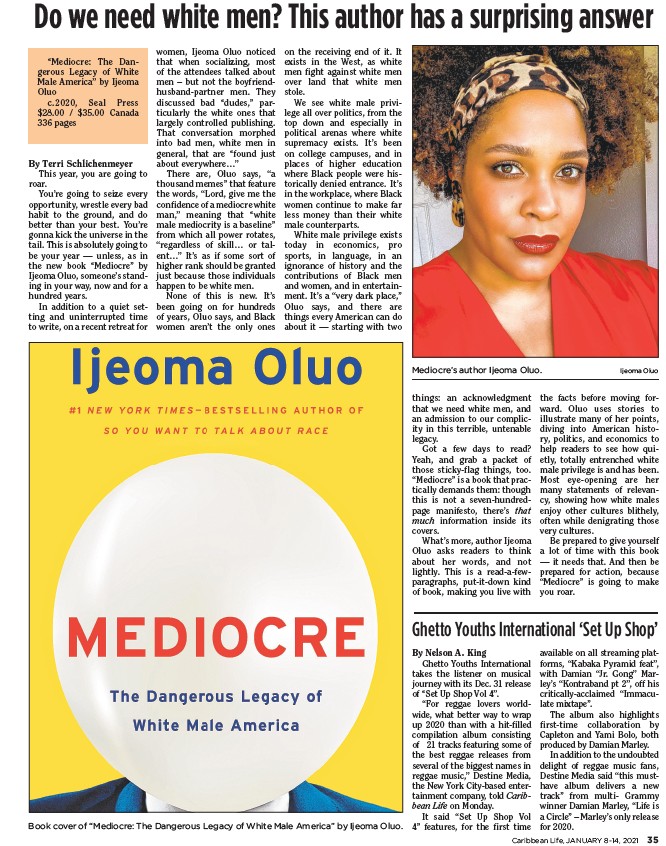
Do we need white men? This author has a surprising answer
Ghetto Youths International ‘Set Up Shop’
Caribbean Life, JANUARY 8-14, 2021 35
By Terri Schlichenmeyer
This year, you are going to
roar.
You’re going to seize every
opportunity, wrestle every bad
habit to the ground, and do
better than your best. You’re
gonna kick the universe in the
tail. This is absolutely going to
be your year — unless, as in
the new book “Mediocre” by
Ijeoma Oluo, someone’s standing
in your way, now and for a
hundred years.
In addition to a quiet setting
and uninterrupted time
to write, on a recent retreat for
women, Ijeoma Oluo noticed
that when socializing, most
of the attendees talked about
men – but not the boyfriendhusband
partner men. They
discussed bad “dudes,” particularly
the white ones that
largely controlled publishing.
That conversation morphed
into bad men, white men in
general, that are “found just
about everywhere…”
There are, Oluo says, “a
thousand memes” that feature
the words, “Lord, give me the
confidence of a mediocre white
man,” meaning that “white
male mediocrity is a baseline”
from which all power rotates,
“regardless of skill… or talent…”
It’s as if some sort of
higher rank should be granted
just because those individuals
happen to be white men.
None of this is new. It’s
been going on for hundreds
of years, Oluo says, and Black
women aren’t the only ones
on the receiving end of it. It
exists in the West, as white
men fight against white men
over land that white men
stole.
We see white male privilege
all over politics, from the
top down and especially in
political arenas where white
supremacy exists. It’s been
on college campuses, and in
places of higher education
where Black people were historically
denied entrance. It’s
in the workplace, where Black
women continue to make far
less money than their white
male counterparts.
White male privilege exists
today in economics, pro
sports, in language, in an
ignorance of history and the
contributions of Black men
and women, and in entertainment.
It’s a “very dark place,”
Oluo says, and there are
things every American can do
about it — starting with two
things: an acknowledgment
that we need white men, and
an admission to our complicity
in this terrible, untenable
legacy.
Got a few days to read?
Yeah, and grab a packet of
those sticky-flag things, too.
“Mediocre” is a book that practically
demands them: though
this is not a seven-hundredpage
manifesto, there’s that
much information inside its
covers.
What’s more, author Ijeoma
Oluo asks readers to think
about her words, and not
lightly. This is a read-a-fewparagraphs,
put-it-down kind
of book, making you live with
the facts before moving forward.
Oluo uses stories to
illustrate many of her points,
diving into American history,
politics, and economics to
help readers to see how quietly,
totally entrenched white
male privilege is and has been.
Most eye-opening are her
many statements of relevancy,
showing how white males
enjoy other cultures blithely,
often while denigrating those
very cultures.
Be prepared to give yourself
a lot of time with this book
— it needs that. And then be
prepared for action, because
“Mediocre” is going to make
you roar.
“Mediocre: The Dangerous
Legacy of White
Male America” by Ijeoma
Oluo
c.2020, Seal Press
$28.00 / $35.00 Canada
336 pages
Book cover of “Mediocre: The Dangerous Legacy of White Male America” by Ijeoma Oluo.
Mediocre’s author Ijeoma Oluo. Ijeoma Oluo
By Nelson A. King
Ghetto Youths International
takes the listener on musical
journey with its Dec. 31 release
of “Set Up Shop Vol 4”.
“For reggae lovers worldwide,
what better way to wrap
up 2020 than with a hit-filled
compilation album consisting
of 21 tracks featuring some of
the best reggae releases from
several of the biggest names in
reggae music,” Destine Media,
the New York City-based entertainment
company, told Caribbean
Life on Monday.
It said “Set Up Shop Vol
4” features, for the first time
available on all streaming platforms,
“Kabaka Pyramid feat”,
with Damian “Jr. Gong” Marley’s
“Kontraband pt 2”, off his
critically-acclaimed “Immaculate
mixtape”.
The album also highlights
first-time collaboration by
Capleton and Yami Bolo, both
produced by Damian Marley.
In addition to the undoubted
delight of reggae music fans,
Destine Media said “this musthave
album delivers a new
track” from multi- Grammy
winner Damian Marley, “Life is
a Circle” – Marley’s only release
for 2020.